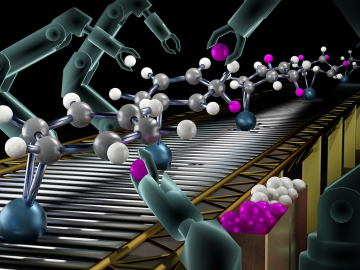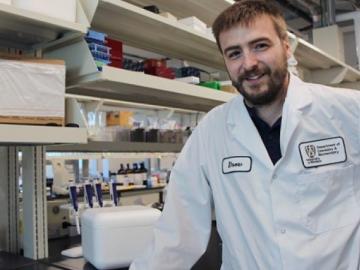
Filter News
Area of Research
- Advanced Manufacturing (2)
- Biology and Environment (5)
- Computational Biology (1)
- Computer Science (3)
- Energy Science (21)
- Fusion and Fission (2)
- Materials (54)
- Materials for Computing (7)
- National Security (5)
- Neutron Science (121)
- Nuclear Science and Technology (5)
- Quantum information Science (9)
- Supercomputing (39)
News Topics
- (-) Critical Materials (29)
- (-) Emergency (4)
- (-) Neutron Science (171)
- (-) Quantum Science (93)
- 3-D Printing/Advanced Manufacturing (146)
- Advanced Reactors (40)
- Artificial Intelligence (131)
- Big Data (79)
- Bioenergy (112)
- Biology (128)
- Biomedical (73)
- Biotechnology (39)
- Buildings (74)
- Chemical Sciences (86)
- Clean Water (33)
- Composites (35)
- Computer Science (226)
- Coronavirus (48)
- Cybersecurity (35)
- Education (5)
- Element Discovery (1)
- Energy Storage (114)
- Environment (218)
- Exascale Computing (67)
- Fossil Energy (8)
- Frontier (64)
- Fusion (66)
- Grid (74)
- High-Performance Computing (130)
- Hydropower (12)
- Irradiation (3)
- Isotopes (62)
- ITER (9)
- Machine Learning (68)
- Materials (157)
- Materials Science (158)
- Mathematics (12)
- Mercury (12)
- Microelectronics (4)
- Microscopy (56)
- Molten Salt (10)
- Nanotechnology (64)
- National Security (86)
- Nuclear Energy (122)
- Partnerships (68)
- Physics (69)
- Polymers (35)
- Quantum Computing (53)
- Security (31)
- Simulation (65)
- Software (1)
- Space Exploration (26)
- Statistics (4)
- Summit (71)
- Transportation (103)
Media Contacts

Matthew R. Ryder, a researcher at the Department of Energy’s Oak Ridge National Laboratory, has been named the 2020 Foresight Fellow in Molecular-Scale Engineering.

Scientists have found a new method to strategically add deuterium to benzene, an aromatic compound commonly found in crude oil. When applied to the active ingredient of drugs to incorporate deuterium, it could dramatically improve the drugs’ efficacy and safety and even introduce new medicines.

Does vaping and smoking e-cigarettes put you at higher risk of COVID-19 complications? UWindsor’s Drew Marquardt is trying to answer that question with research into how the toxicants in the oils of vapes and e-cigarettes affect lung function.

Research by an international team led by Duke University and the Department of Energy’s Oak Ridge National Laboratory scientists could speed the way to safer rechargeable batteries for consumer electronics such as laptops and cellphones.

For the second year in a row, a team from the Department of Energy’s Oak Ridge and Los Alamos national laboratories led a demonstration hosted by EPB, a community-based utility and telecommunications company serving Chattanooga, Tennessee.

With Tennessee schools online for the rest of the school year, researchers at ORNL are making remote learning more engaging by “Zooming” into virtual classrooms to tell students about their science and their work at a national laboratory.

In the early 2000s, high-performance computing experts repurposed GPUs — common video game console components used to speed up image rendering and other time-consuming tasks

In the race to identify solutions to the COVID-19 pandemic, researchers at the Department of Energy’s Oak Ridge National Laboratory are joining the fight by applying expertise in computational science, advanced manufacturing, data science and neutron science.

Oak Ridge National Laboratory researchers working on neutron imaging capabilities for nuclear materials have developed a process for seeing the inside of uranium particles – without cutting them open.



